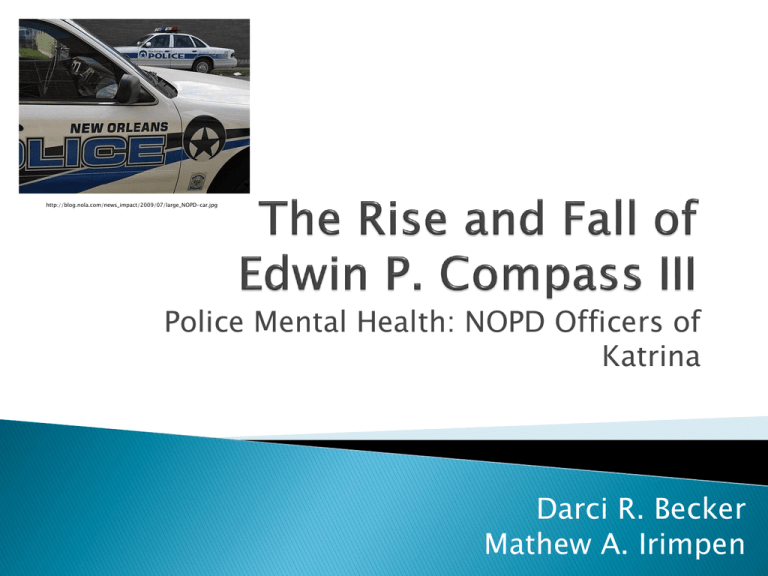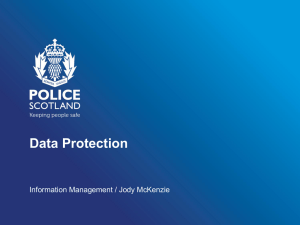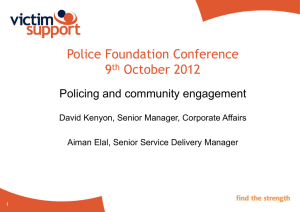The Rise and Fall of Edwin P Compass III
advertisement

http://blog.nola.com/news_impact/2009/07/large_NOPD-car.jpg Police Mental Health: NOPD Officers of Katrina Darci R. Becker Mathew A. Irimpen Eddie Compass as leading authority: ◦ NOPD indirectly under social contract ◦ Reliant on the consent and content of the people of New Orleans to remain a legitimate authority ◦ Police Chief Eddie Compass as the authority leader. http://adventures-of-sherry.com/images/week41/St-Patricks/EddieCompass-Sherry.jpg http://www.sptimes.com/2005/09/13/images/xlarge/A_1_1acompass_222939_0913.jpg Lockean approach to the authority failure and state of nature situation Authority failure ◦ Eddie Compass failed to protect natural rights of New Orleanians ◦ Now in the process of writing a new social contract for police authority ◦ Will properly hold NOPD responsible, accountable, and trustworthy in protecting natural rights. SON ◦ Locke SON may involve illegitimate authority (i.e. tyranny or conquest) ◦ Katrina Extent of police brutality and abuse of power. NOPD trials are evidence of tyrannical and unjust use of power. On the contrary, Compass denies that the NOPD ever stopped protecting citizens’ right to life: "Are you crazy?...We did everything we could to protect human life...Where's the chief? Where's the mayor? On the front lines in the command." http://wwwimage.cbsnews.com/images/2005/09/27/image887319g.jpg http://blog.nola.com/editorials/2009/04/large_letten.JPG ◦ “Katrina merely accelerated problems and break downs in the NOPD to critical mass” NO public made aware of the NOPD’s failure and tyranny ◦ Federal probe into NOPD US attorney will provide recommendations for reforming the Department Approval and implementation of reforms will be symbolic of a new social contract. House of Cards: When the leader falls, the rest follow Worden: “Orientations of chiefs influence officers’ behavior trough the medium of organizational structure” http://newsimg.bbc.co.uk/media/images/40848000/jpg/_40848828_compass_ap_203body.jpg Repeating rumors to national media ◦ "In hindsight, I guess I heightened people's fears…reporting these things that were reported to me” Murders and rapes in Dome Snipers shooting rescue helicopters Worden: “Policies that set clear boundaries around the use of deadly force and that provide for effective enforcement...have reduced the number of shootings” ◦ Exact opposite of occurred: “Take the streets back! Do what you have to do.” ◦ Vague orders + exhausted, stressed, paranoid officers = Authority tyranny and breach of social contract http://www.cbsnews.com/video/watch/?id=8 21597n&tag=related;photovideo “Stressed” is an understatement ◦ Suddenly homeless ◦ Exhausted from working days on end ◦ Paranoid over their personal safety thanks to Compass’ rumor repeating In no condition to be protecting the city’s natural rights of a city--far too unstable. http://www.anniemayhem.com/blog%20pics/Nagin_Riley_Idiots.jpg Imagine this: Deputy Chief has given you permission to “do what you have to do.” Is it any surprise that the city’s police authority broke down? No. http://www.zcommunications.org/FCKFiles/Image/NOPD5-BeatDown-big.jpg Personal Stress: Social network endangered “I mean, I actually had cops that were on the radio, you know, just speaking plainly, saying Jeff, come and get us out. You know, I mean I’m here with my entire family and we’re trapped in the attic and we can’t get out.” Depression and Suicide “Well, different people handle pressure different ways. You know, we had some guys that committed suicide.” “You know, they obviously weren’t – weren’t thinking right...we had a lot of family members of police officers that ended up, you know, drowning or dying.” Fear ◦ “We put perimeter guards out to keep thugs and gangsters from sneaking up while all these cops were sleeping out in the open like that with their…it was scary then because we were sleeping in pitch darkness. I mean pitch darkness.” http://www.wdsu.com/2010/0814/24627658_240X144.jpg “Dealing with death results in emotional trauma and in psychological transformations that in turn lead to the evolution of new modes of adaptation, thought, and feeling within the individual encounters death” Death encounters are extremely sensitive matters. A death imprint will have profound effects on an officer and can result in dramatic change of manner. “Then we get another call of a suicide, which I don’t think it was. I think the wind just blew him off. But a guy was apparently walking off of the Claiborne overpass and a wind gust blew him over the side, and he’s laying on the ground on Claiborne and Earhart dead, under the bridge, with his head busted open. He stayed there for a month. They just laid there. There was nothing we could do. We had nowhere to put them. I think, for me, that’s probably the worst of what we had to physically deal with ourselves. About the third week into the hurricane, we got a call of a murder that the body was floating on Martin Luther King and Galvez. And he had floated out of the Calliope Project. He had a bullet hole in the head. It was really gruesome. To be blatantly blunt with you, the body was floating in water about three feet deep, it had dogs chewing on it. It was awful. So. That’s the worst of it.” Comparing Katrina and 9/11 (Henry) ◦ Katrina was extraordinary case for NOPD ◦ Massive, prolonged, unimaginable death imprint ◦ Compass: “No police department in the history of the world was asked to do what we did” Compass on Comparison ◦ “Yes there are similarities, but NYPD had their families safe at home. We had our families under duress that we had to take care of first. Honestly my wife, pregnant at the time, was my #1 priority.” (Compass 2010) http://wwwimage.cbsnews.com/images/2005/09/19/image857787b.jpg Take police out of picture: require military response to large scale trauma, remove emotional ties Opposition – outsiders policing our city Partner with other state national guards: Texas, Georgia, Florida Coast guard – specially trained for search and rescue, federal Regular mandatory Psychiatric examinations for officers “Big Brother/Sister” mentoring program in Police Academy ◦ ◦ ◦ ◦ ◦ ◦ ◦ ◦ ◦ ◦ ◦ ◦ ◦ ◦ ◦ ◦ ◦ ◦ ◦ Backon, Mia. 2010. “Jeffrey Winn Oral History.” Policing Katrina Wiki. Retrieved November 10, 2010 (http://policingkatrina.wikispaces.com/Oral+Histories). Channing, Joseph. 2006. "Police Chief Says He Exaggerated Post-Katrina Crime." The New York Sun. August 21. Retrieved November 10, 2010. (http://www.nysun.com/national/police-chief-says-he-exaggerated-post-katrina/38268/). Compass, Edward. 2010. Personal Interview, November 10. CBS News. 2006. “Video: Chief Blasts Media Coverage”. Retrieved November 10, 2010. (http://www.cbsnews.com/video/watch/?id=821031n) D’Avella, William. 2010. “Anthony Cannatella Oral History.” Policing Katrina Wiki. Retrieved November 10, 2010 (http://policingkatrina.wikispaces.com/Oral+Histories). Elghazi, Christina. 2010. “David Kirsch Oral History.” Policing Katrina Wiki. Retrieved November 10, 2010 (http://policingkatrina.wikispaces.com/Oral+Histories). Filosa, Gwen. 2005. "N.O. police chief defends force." The Times-Picayune. September 5. Policing Katrina Wiki. Retrieved November 11, 2010. (http://policingkatrina.wikispaces.com/Newspapers). Henry, Vincent E. 2004. Death Work: Police, Trauma, and the Psychology of Survival. New York: Oxford University Press. Kapacinskas, Vytas. 2010. “John Bryson Oral History.” Policing Katrina Wiki. Retrieved November 10, 2010 (http://policingkatrina.wikispaces.com/Oral+Histories). Letton, James. 2010. Personal Interview, October 21. Smith, Stephen W. 2005. "Police Shoulder the Stress: Amid Loss of Lives, Jobs and Homes, New Orleans Force 'Still Standing.'” CBS Evening News. September 6. Policing Katrina Wiki. Retrieved November 11, 2010. (http://policingkatrina.wikispaces.com/Newspapers). Worden, Robert E., 1995. “The ‘Causes’ of Police Brutality: Theory and Evidence on Police Use of Force,” in William A. Geller and Hans Toch, eds., And Justice for All: Understanding and Controlling Police Abuse of Force. Washington: Police Executive Research Forum. Walker, Samuel. 2003. “Victims and Offenders: Myths and Realities About Crime,” in Samuel Walker et. al., The Color of Justice. USA: Wadsworth Publishing.









